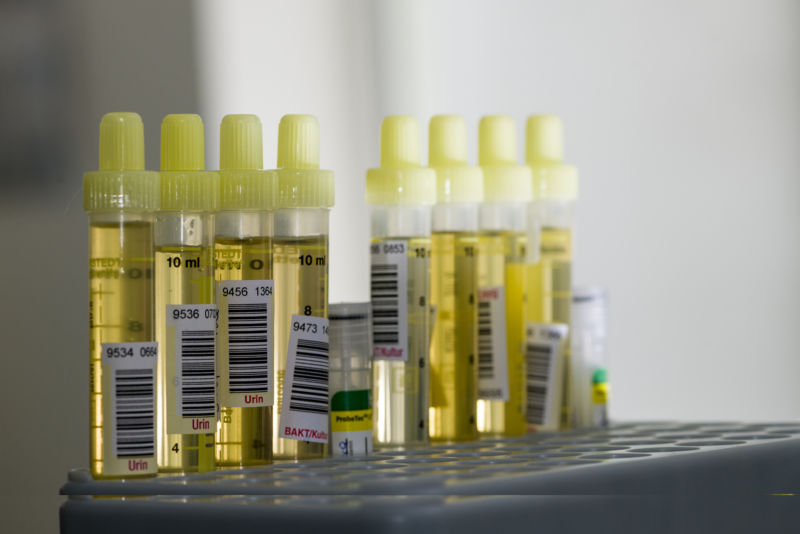
In 2015, a college student in Texas named Elizabeth Moreno had back surgery to correct a painful spinal abnormality. The procedure was a success, and her surgeon followed it with just a short-term prescription for the opioid painkiller hydrocodone to ease a speedy recovery. Then came a “routine” urine drug test, ostensibly to ensure she didn’t abuse the powerful drug.
A year later, she got the bill for that test. It was $17,850.
She understandably didn’t see it coming, according to a report on her case in Kaiser Health News. The surgery was covered by her insurance and she had weaned herself off the painkiller with no problems. When the surgeon’s office asked for the urine test in mid-January 2016, “I didn’t think anything of it,” Moreno told KHN. “I said fine, whatever.”
But doctors and experts say that test was unnecessary, the price “outrageous,” and the case just the latest in a new, alarming trend.
“This just blows my mind,” Jennifer Bolen, a former federal prosecutor and lab and pain management consultant told KHN. “It’s very high and incredibly out of the norm.”
The testing lab, Sunset Labs, was considered out of network for Moreno’s insurance. But that may be the least of the problem. Sunset also has an “F” rating from the Houston Better Business Bureau for charging thousands of dollars for tests that cost a few hundred dollars—tops. And Sunset Labs is part of a network of pain clinics owned by Houston anesthesiologist Phillip C. Phan, which is facing lawsuits and complaints related to forced, unnecessary testing and improper billing.
Moreno’s insurance company valued her $17,850 urine test at $100.92.
In an emailed statement to KHN, an attorney for Sunset said the lab’s billings “are in line with the charges of competing out-of-network labs in the geographical area.”
The bill’s breakdown shows Sunset charged Moreno $4,675 to screen for a variety of opioids, $2,975 for psychiatric benzodiazepine drugs, $1,700 for amphetamines, $1,275 for a host of illicit drugs, and $850 for buprenorphine, a drug to treat opioid addiction. Sunset added another $850 fee to verify that the urine hadn’t been adulterated, among other charges.
Gold rush
Such extensive testing—and exorbitant billing—has become more commonplace amid the national epidemic of opioid abuse and overdose deaths. The Centers for Disease Control and Prevention estimates that an average of 115 Americans die each day from opioids.
In an apparent effort to catch opioid abuse, some doctors have turned to routine urine drug testing, which lacks standardized pricing. In a November report from KHN, an investigation into Medicare and private insurance billing conducted with Mayo Clinic found that spending on drug-related tests quadrupled between 2011 and 2014 to an estimated $8.5 billion dollars a year. KHN noted the annual spending on drug testing is now more than the whole budget for the Environmental Protection Agency.
Moreno’s doctor, Dr. Stephen Esses, reportedly said that he ordered drug testing on patients out of fear of getting in trouble with the state’s medical licensing board. But a spokesperson for the Texas Medical Board told KHN that it doesn’t require testing for short-term opioid prescriptions like Moreno’s. And simpler tests that just look for the presence or absence of select drugs—rather than specific levels of a sweeping list of drugs—are much more affordable. Those simpler tests are rarely over $200 and usually much less.
Moreno’s father, Dr. Paul Davis, is a retired family practice doctor and tried to fight the bill for her. In April 2017, he settled the bill with Sunset by paying $5,000—a move he now regrets. Dr. Davis also filed a complaint with the state’s attorney general’s office, which confirmed it had received complaints about Sunset but wouldn’t comment further.
https://arstechnica.com/?p=1262525

